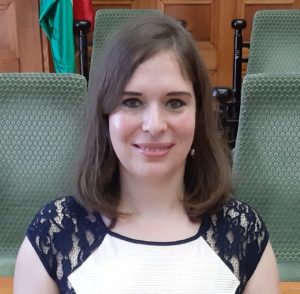 |
Contact details: fekete.adrienn@pte.hu; events@educationalroleoflanguage.org |
| Affiliation: University of Pécs, Hungary | |
| ERLA key words; language and culture, identity, multilingualism, the psychology of learning, online education, the Virtual Self, intercultural communication, drama-based teaching | |
| ERLA key problems: How do we compose our language(s)? How do we experience our language(s)? How do we develop our language(s)? How do we treat our language(s)? |

Language and culture are inherently interwoven in human communication and thus in education drawing on language learning and communication. I perceive language use and language learning as a transformative experience shaping the individual’s life choices, emotions, thoughts, actions, and activities. These ideas fully resonate with the fundamental pillars of ERL. I treasure the myriad of opportunities that ERLA provides to learn about insights, ideas, findings, discoveries, and initiatives by colleagues and students coming from diverse linguacultural backgrounds in faraway corners of the world. Therefore, collaborating with like-minded individuals is a professional and personal pleasure for me. As an ERL Think Tank Member, I am working towards creating even more opportunities to share ideas, research projects, and initiatives with individuals, institutions, and organizations that focus on the central role of language in education and culture. Being a creative and enthusiastic individual, I greatly enjoy creative brainstorming that may take us to uncharted territories that we can explore.

As there is no education without language, language plays a fundamental role in education in general as well as in the micro-context of teaching and learning by teachers and learners alike. Learners’ and teachers’ interactions in and outside the classroom shape their identities, trigger emotional responses, novel thoughts and new ideas in them, and result in tangible actions and activities, affecting their life choices as a transformative experience. Understanding ourselves and others are the building blocks of healthy psychology and successful communication without which there is no successful, effective, or engaging education.
Second, there is no education without learners, and there is no education without teachers; therefore, I find it equally important to address the needs of not only learners but also of teachers. Teachers’ problems, fears, anxieties, needs, and well-being should also be tackled so that they can provide quality instruction using effective teaching methods and practices. The individual differences (i.e., the psychology) and general well-being of both teachers and learners must be considered if we are to make education successful, enjoyable, and effective.
We live in a multicultural and multilingual world where students and teachers may come from diverse linguistic, cultural, social, and educational backgrounds; therefore, successful education draws on successful intercultural communication in multilingual and multicultural contexts. Successful intercultural communication requires an understanding of and openness to other cultures and identities. Encouraging learners and teachers to voice their linguistic, cultural, national, and ethnic identities provides favorable conditions for learning in and via language as well as opportunities for learning from each other in the classroom.
Finally, with the introduction of online education due to the COVID-19 pandemic, the psychology of online education has come to the fore. Complex dynamic systems theory can provide an understanding of the interconnectedness of individual differences, individuals, and the environment as well as pinpoint behavioral patterns that are conducive to learning in the novel context of online education. In the same vein, the Virtual Self of learners and teachers should also be addressed as a real-life – and oftentimes – transformative experience in the online space.
I have already learnt a lot from my colleagues and friends coming from different corners of the world, I have adopted, adapted, and shared new ideas and initiatives in an effort to better my own teaching and research practice. I would like to continue to grow as a teacher and as a researcher and I would like to call educators’ and teachers’ awareness in other contexts to the importance of language, culture, and identity in education. I would like to convey to them the message that learning is much more than covering materials andtesting students’ knowledge of what they have memorized. Language learning, language use and interactions in and via language in education is a psychological, emotional, cognitive, and life-shaping experience that shape who we are as individuals, as communities, as professionals, as teachers, and as learners. I strongly believe in these idea(l)s. . As we carry on our ERLA work, I would like to tackle issues that can make the world a better place by finding answers to crucial social and educational issues such as addressing the multiliteracies of multilingual and multicultural students, teachers, and immigrants, creating equal opportunities to marginalized groups in education and in society at large, as well as tackling the challenges of the 21st century such as equity in digital humanities and the virtual identity construction of individuals involved in online learning and teaching..
